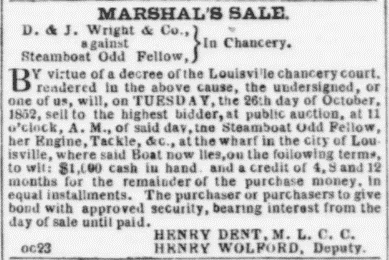Old Times by Capt. Gillett – Writing to our esteemed friend Capt. Gillett, for some special information, the other day, he adds to his answer the following incidents:
Capt. Gillett says that he can recollect that 1817 was a season of long-continued low water and by far the smokiest. It was famous for many years as the smoky fall. Ferrymen had to keep a man continually ringing a bell on the shore while the boat was crossing for many days. The woods were on fire in many places, and people got lost in the smoke while lighting fires.
The winter of ’27 and ’28 was the warmest, cloudiest and foggiest. Peach trees are in full bloom the first week in February and not a particle of ice in the river all winter. 1832 gave us the highest flood by 2 inches here; also higher at Pittsburgh by 12 feet, and at Marietta by 6 feet than the high flood a few years after. 1838 gave us the lowest water by 10 inches, but 13 inches on the bar at Guyan and very little more at Twelve-pole, Quicks’ Run, Snag Bar, and 4 miles.
Captain Wash Kerr and I [Capt. Gillett] carried a couple of flatboats ladened with dry goods from Portsmouth to Louisville on hand spikes with the help of a great amount of dragging and shoving to deeper channels.

The government should have made us an appropriation of a few hundred for river improvements. You may judge from the freight rates we got about the water stage. We got $1.25 per hundred lbs. to Louisville, and 75 cents was the tariff to Cincinnati. Not a boat turned a wheel above Cincinnati for two months except an effort made by the little steamboat ‘Odd Fellow’ [see photo] to come from Cincinnati to Maysville. She was no larger than a large steamboat’s yawl. She reached the foot of 4 – the mile bar, 10 miles above the city, and could not get over.
I made a call to my old friend C. W. Wakefield, the other day. He gave me a great many interesting incidents of the early settlement of the upper end of the county, among which he and three or four other young men, all of whom I used to be well acquainted with, saw 18 wolves swim the river, coming out just below where my home stands. This was in 1816, two years before I came here. Mr. Wakefield showed me a wild-cherry tree not over 50 years old, from the seed that is now 7 feet in circumference. Please put that on paper.
Capt. Gillett
Ironton Register,
Thursday, February 7, 1878

0 Comments